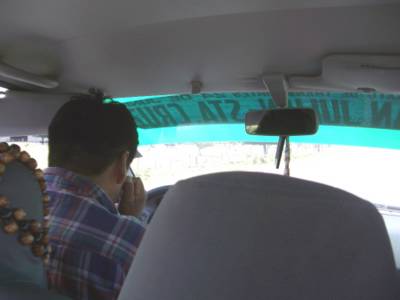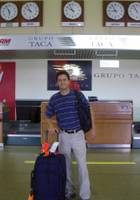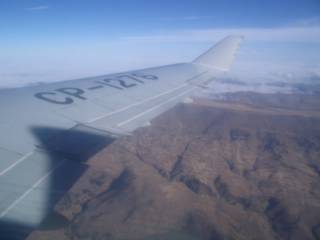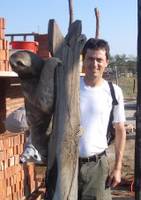My ride to retrieve luggage that morning was shared with Rachel, another Habitat volunteer delayed by the strike. She had waited out the labor dispute in Bogotà and flew into Santa Cruz a few hours after me. Rachel was nice enough to take the cab out to the airport with me in case I needed her fluent Spanish.
Once I had my bag, Carmen put Rachel and me in a taxi for the two hour ride to San Julian.
All the cab drivers I met in Bolivia were pretty sociable. But not this guy. We never even got his name. We tried to make small talk by asking him about the CD he was playing, but he just grumbled - which in Spanish sounds the same as in English. After a short while on the narrrow road, I was a little concerned to see him rubbing his eyes and drooping his head. We were traveling about 70 mph with no seat belts, and he looked like he might pass out. At the same time, he was treating the pot holes like a slalom course, using both lanes and both shoulders. Sometimes it was hard to tell if he was carving his path or weaving off the road.
Rachel and I gave him some crackers to wake him up. Then we noticed him sniffling, and he sneezed a few times. Maybe he was not tired at all, maybe allergies were making his eyes itch. And, as for the drooping head, that was the only way he could see under the huge green decal at the top of his windshield. So, we chose to believe these things and enjoy the thrill ride.

Crossing Rio Grande o' Guapay at Puerto Palias. The
railroad bridge serves cars and trains one direction
at a time.
Thanks to the strike, I didn’t get to Santa Cruz in time to rendezvous with all the other Habitat volunteers. They had flown in from Miami just before the strike and hired a van to San Julian two hours away. So, when I landed the next afternoon, I was grateful that the local Habitat affiliate sent a coordinator, Carmen, to greet me at the airport.
She found me filling out some lost luggage papers and trying my best to speak Spanish to Lissandro, the lost luggage go-to guy at the Santa Cruz airport. At first I thought he was fluent in English because he spoke such perfect grammar with barely any accent. “Your bags will be here, Mr. Troy. Please, do not worry. I am certain they will arrive tomorrow morning. Go to your hotel and have a comfortable night. Come back tomorrow, and your bag will be here. Everything will be OK.” It made me think of a valet offering pleasant accommodations to James Bond just before planting snakes in his suite. And when I pressed him on the details, like which flight the bag would be coming in on and if there were any way to use the bar code on my claim check to track the bag’s present location, it became clear that he was only performing lines well rehearsed for Americans. So I managed to dig deep for the Spanish phrases I needed, and despite Lissandro’s apparent unfamiliarity with the technological breakthrough we know as bar codes I got the answers I wanted to hear. Somehow Lissandro’s optimism was rubbing off on me. Images of my bag being eviscerated in the lost luggage office of the Mexico City airport began to fade.
On the cab ride to the hotel, Carmen was also optimistic. After a few days in Bolivia, I started to see this pattern in the people I met there. They deal with set-backs all the time, and they just seem to plow steadily ahead. Like on the plane, when the pilot announced our diversion to a different city. No one had reacted with more than a shrug. If that were to happen on an American domestic flight, some drunken passenger would scream out his demands to see Wilbur Wright immediately.
Carmen checked me into the hotel, courtesy of Habitat, and explained to the front desk that I would need an airport taxi first thing in the morning. It was now the hotel manager’s turn to be reassuring. “Oh, Mr. Troy, you will have no problems getting your luggage. It is being well cared for. In the morning you will have a nice breakfast, and your luggage will be waiting for you at the airport.”
My room was small but very comfortable, if a bit chilly with no heating system at all. What I didn’t yet know about Bolivian hotels is that if you want heat, the front desk will send up a space heater for a few extra bolivianos. I took a cold shower because I didn’t know how to work the electric water heater. Then I crawled into bed, but the thin blanket was not enough. So the front desk sent me a thicker one. I rolled myself burrito-style into the blankets and slept like a baby.
The next morning, I had a nice breakfast. The cab driver arrived as soon as I was ready. I found my bag and all its contents at the airport just like everyone said I would.
I woke at 4:00AM with about an hour left of my long flight from Mexico City to Santa Cruz, Bolivia. That’s when the pilot made an unexpected announcement.
Bolivia’s air traffic controllers had gone on strike – while I was in mid-flight – and we would be diverted to Cochabamba.
No one knew if the strike would last an hour, a day, or a month. While waiting for my luggage to come out on the carousel at the Cochabamba airport – which it never did – I considered taking a bus to Santa Cruz, but that would have been eleven hours of uncomfortable traveling.
The airline put us up in a four star downtown hotel where I had a nice breakfast, a nap, and a hot shower. But no fresh clothes and no shave. All that stuff was in my checked luggage, and who knew where that could be? My jacket was also in that bag, and Cochabamba was cool and cloudy – in the low 50’s.
There were about sixty of us from two different Lloyd Aereo Boliviano flights staying at the hotel. One of my fellow passengers was a missionary originally from Florida. She and her husband had been living in Uruguay with their four kids and were in the process of moving to Bolivia. But the somewhat arbitrary entry taxes were forcing them to store their furniture at the border until they could negotiate lower property taxes. She described it all as a system of semi-legalized bribes. Her trip that week had been to Florida to look into a possible move back to the states.
Throughout the morning there was no news about the strike. But at one o’clock, just as we were finishing the buffet lunch, fifteen taxis pulled up to the front of the hotel and hurried us back to the airport.
After about two hours of waiting, we boarded our plane and waited another hour. We taxied out. Then we taxied back to the terminal. The pilot announced we needed a different plane. Then, he decided this one was fine. We taxied back out again and finally took off.
But the question remained. Where the hell was my luggage?

The buses to downtown hotel, courtesy of Lloyd
Aereo Boliviano. The vacated control tower
in the background.






